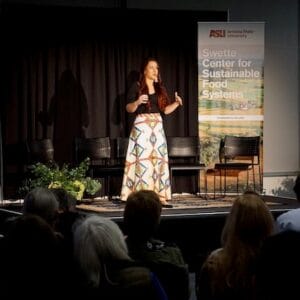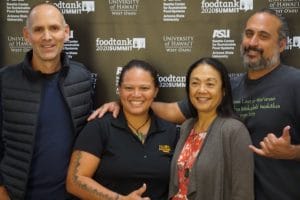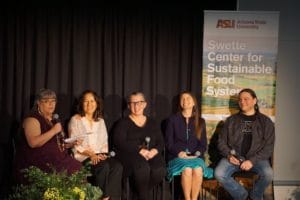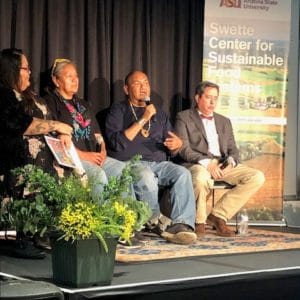
By Sharla Strong, Swette Center for Sustainable Food Systems
Indigenous foods within the United States are rich in diversity. From taro root in Hawaii to the salmon of the Pacific Northwest, from wild rice of the Great Lakes Region to buffalo of the plains, Indigenous people are continuing their food cultures and working for the benefit of future generations.
Indigenous Food Systems are the first “local food” within the United States and there are many Indigenous foods that originate from the Americas and have fed the world including corn, potatoes, tomatoes, chocolate and more. Recent Indigenous generations have faced incredible barriers to practicing their foodways, including forced relocation away from cultural food sources, extermination of their foods, and dietary changes through boarding schools, forced farming and commodity food replacement. In recent generations, Indigenous communities have made great strides toward revitalizing cultural foods. As allies and food policy leaders are working toward inclusivity and equality in US policy, it is important to include and listen to the communities in planning for the future.
“The Wisdom of Indigenous Foodways” FoodTank Summit hosted by the Swette Center for Sustainable Food Systems at Arizona State University, in partnership with Sustainable Community Food Systems Program at the University of Hawai’i, West O’ahu brought together innovative voices in Indigenous foodways and rights–and the allies who seek to support them. The audience at the Food Tank exceeded expectations which demonstrates the enthusiasm and interest in this topic, drawing a standing-room-only crowd of over 350 people and thousands more on the livestream. (Watch the Livestream Recording)
The Summit featured native voices and, over the course of three hours, speakers covered a wide range of issues from biodiversity, to wild foods, landrace property rights, and more all while sharing inspiring models of strength and innovation within Indigenous communities. Often the conversation around Indigenous Foods revolves around disparities related to diet, including diabetes, obesity and hunger. The “Wisdom of Indigenous Foodways” FoodTank Summit sought to counter that narrative with stories of strength and resilience. Featured speaker, Mariah Gladstone (Blackfeet, Cherokee), pictured above, founder of the online cooking show, Indigikitchen, promotes multicultural learning between tribes and during the event shared numerous stories of success she has heard from across the United States. Gladstone shared, “There is a village in Alaska, Kake. A very small village, predominantly native people and in the 1980s it was leading the nation in suicide rate. In 1988, they formed a Culture Camp that for two weeks took kids and taught them things about Indigenous foods. They learned how to make devil’s club tea, they learned how to dress a seal, they learned fishing, they learned all these traditional skills about their Indigenous foods. Which not only taught them how to live off the land, but also connected them to their environment, connected them to that inherent wisdom of their ancestors and their identities. Three years later, there were no more suicides in Kake and it remained that way for over two decades.”
As diversity and inclusion have been growing themes in social justice, Indigenous voices are still lacking in mainstream media and this includes Native Hawaiian representation. One of the panelists, Paula Daniels (Native Hawaiian), Co-Founder of Center for Good Food Purchasing was interviewed recently by FoodTank discussing examples of how Supporting Indigenous Foodways Is For Everyone. “Hawai’i was once a self-sufficient island nation. It fed a population close to one million people in a non-urbanized environment, with a very important stewardship model,” says Daniels. “Their organizing unit for their systems was called the ahupua’a, which was a unit of governance that flowed from the mountains to the oceans, along the watershed. They were caring for that particular watershed and the entire ecosystem.”
Daniels notes that with the eradication of Indigenous Foodways, Hawai’i was forced to import nearly 95 percent of its food from the continental United States—a percentage that is decreasing with local Hawai’ian efforts to reclaim their agricultural autonomy.

MA’O Organic Farms is one such initiative aimed at reclaiming food sovereignty, local food, culture, education and economic development, and is a model collaboration between MA’O Organic Farms and the University of Hawai’i. Cheryse “Kaui” Sana (Native Hawaiian) is the MAʻO Farm Manager, working closely with Native Hawaiian community students to build employment and educational opportunities. From the stage, Sana spoke about the progress that MA’O Organic Farms has achieved, and how mentorship and cultural values and teachings guide their program development. Sana shared philosophy about how in her work, she is not teaching people--the land is teaching them. This reciprocal relationship with the land and people shows in the health of the land, the health of the people, and the quality of the food. MA’O Organic Farms is now the largest organic farm on the island. Kamuela Enos (Native Hawaiian), Social Enterprise Director for MA'O Organic Farms, has been instrumental to the collaboration with University and is now moving into a new position as the Director of Indigenous Innovation with the Office of the Vice President of Research and Innovation at the University of Hawai’i. Enos spoke about the collaboration with the University of Hawai’i and how MA’O Organic Farms was founded by Native Hawaiians to serve their community needs of employment and education. University of Hawai’i, Assistant Professor of Sustainable Community Food Systems, Albie Miles, spoke about the need for healthy collaboration with Indigenous communities, stressing the needed accountability of academics and educational institutions to the extractive relationships that continue today toward Indigenous communities. It is common practice for researchers and academics to enter into Indigenous communities, write about what they learn and then get the credit for what Indigenous people already knew or had created. This is the extractive, non-reciprocal relationship and attitude that prevents Indigenous communities from getting the credit or compensation for seeds they have developed over thousands of years, sustainable land management practices, medicines, and more.

Chef Sean Sherman, also known as The Sioux Chef, author of a James Beard Award winning book The Sioux Chef’s Indigenous Kitchen, spoke about his most recent projects including a non-profit called North American Traditional Indigenous Food Systems with the mission to promote Indigenous foodways education and facilitate Indigenous food access through the Indigenous Food Lab. This non-profit restaurant brand, education and training center will serve as the heart of NATIFS work establishing a new Indigenous food system that reintegrates Native Foods and Indigenous focused education into tribal communities across North America. He is preparing to open the first location in Minneapolis and in the future envisions developing and supporting multiple tribally operated kitchens bringing cultural and nutritional revitalization to Indigenous communities around the world.
There is a growing understanding that Indigenous knowledge is synonymous with science and Indigenous wisdom is based on thousands of years of case studies. Indigenous people have resided in the United States for thousands of years and countless generations. Indigenous people around the world all have deep understanding of the land, soil, plants, animals and climate within their homelands that has astounded newcomers. Many people do not realize the scientific advancement of Indigenous cultures and that many of the discoveries of science and medicine have been commonly known and utilized within Indigenous communities over millennia.

Tribes are a large part of Arizona’s identity and local stories of success were shared from San Carlos Apache, Tohono O’odham and Hopi Tribes. Twila Cassadore, an elder from the San Carlos Apache Tribe, spoke about learning from her elders as the traditional way of learning and recognizing that it is because of the elders that we are here today to carry on the traditions. Terrol Dew Johnson, spoke about being raised by his grandparents on the Tohono Oodham reservation and how traditional foods practices were family activities integrated into their lifestyle. It wasn’t until he was older that he realized other people didn’t live like that and he wanted to help his community learn. Terrol has been working over 30 years on Tohono O’odham cultural revitalization within his community, starting a non-profit, traditional farm, and he is currently an artist making traditional and contemporary basketry. He emphasized that all parts of the culture are intertwined in food revitalization including songs, art, stories and language. Michael Kotutwa Johnson spoke about the resiliency of Hopi corn that is adapted to the climate of the reservation and does not receive any irrigation. The strength of the corn in the desert is evidence of the strength of Indigenous cultural foodways and the resiliency of its people.
The highlight of the event was the Indigenous Foods reception, which offered the rare gift to taste Indigenous foods, by Indigenous people and supported Indigenous economy with samplings of Apache and O’odham foods. Twila Cassadore, and her sister Julie Cassadore, (San Carlos Apache) offered traditional wild foods that she and her family harvested as well as foods that they grow at home on the reservation. Twila served Blue Corn Mush with prickly pear and pumpkin seeds and a Desert Cactus Salsa that included barrel cactus fruit and seeds, and nopales pads. From Desert Rain Café and Ajo Farmer’s Market and Café, Terrol Dew Johnson (Tohono O’odham), Sterling Johnson (Tohono O’odham) and Nina Sajovec served foods that had been wild harvested by Tohono O’odham tribal members and grown at Alexander Pancho Memorial Farm, which is a dryland farm located on the Tohono O’odham reservation. Foods for these Cafés are also sourced through the beginning farmer training program by AJO CSA as well as other Akimel O’odham farmers and foragers. Among the tastings that were offered were Tepary Beans, Tohono O’odham Corn and Squash. Tepary Beans are a common staple food for tribes of the Southwest and is featured in the Tohono O’odham creation story. Tepary beans carry a cultural significance as well as an important source of nutrition with high levels of protein and fiber. Adapted to the extreme desert sun and heat, Tepary beans also thrive in the alkaline soils. The Tohono O’odham corn (Gai:wsi) is a 60 day variety that is harvested in the milky stage and roasted over mesquite coals and dried in the sun. As a dessert, Tohono O’odham Squash (Ha:l) cake was topped with a prickly pear whipped cream. The Indigenous Foods reception gave the audience a chance to interact with the amazing speakers featured at the FoodTank.
Food Sovereignty and Traditional Ecological Knowledge are important to Indigenous communities and through events such as the FoodTank Summit, the Swette Center for Sustainable Food Systems seeks to support the efforts of tribal communities to create food security for their cultural foods. Arizona State University has a large American Indian student population and our hope is to grow student interest in Indigenous food systems, which are vital for cultural continuity and health for future generations.
FOR MORE ON INDIGENOUS FOODS:
Indigenous Food Sovereignty in North America (sponsored by the Swette Center for Sustainable Food Systems at Arizona State University), Journal of Agriculture, Food Systems, and Community Development, Volume 9, Supplement 2, Fall 2019
The Wisdom of Indigenous Foods (Watch the Livestream Recording)
Indian Country Today Commodity? A gift from the Earth by Quindrea Yazzie (Navajo), Reporter-Producer
FoodTank interview with Janie Hipp (Chickasaw) Native American Agriculture Fund: Native American Agriculture Fund Is Helping Empower Farmers
FoodTank interview with Paula Daniels (Native Hawaiian) Center for Good Food Purchasing: Supporting Indigenous Foodways Is For Everyone
FoodTank interview with Mariah Gladstone (Blackfeet, Cherokee) Indigikitchen: Indigikitchen Is Bringing Native Food Sovereignty Online
FoodTank’s Dani Nierenberg podcast interview with Kathleen Merrigan, Swette Center for Sustainable Food Systems at Arizona State University: The Wisdom of Indigenous Foodways
OP-ED, Kathleen Merrigan, Swette Center for Sustainable Food Systems at Arizona State University: Indigenous Foodways
Listen to Kathleen Merrigan (ASU Swette Center for Sustainable Food Systems) and Janie Hipp’s (Native American Agriculture Fund) NPR interview on KJZZ News: https://fronterasdesk.org/content/1410976/how-can-we-learn-indigenous-communities-foodways
ASU Now article: ASU’s Swette Center for Sustainable Food Systems to co-sponsor Food Tank Summit
ASU Now article, by William H. Walker VI: Uplifting indigenous voices for a sustainable future in food
ASU Sustainability News: The Wisdom of Indigenous Foodways